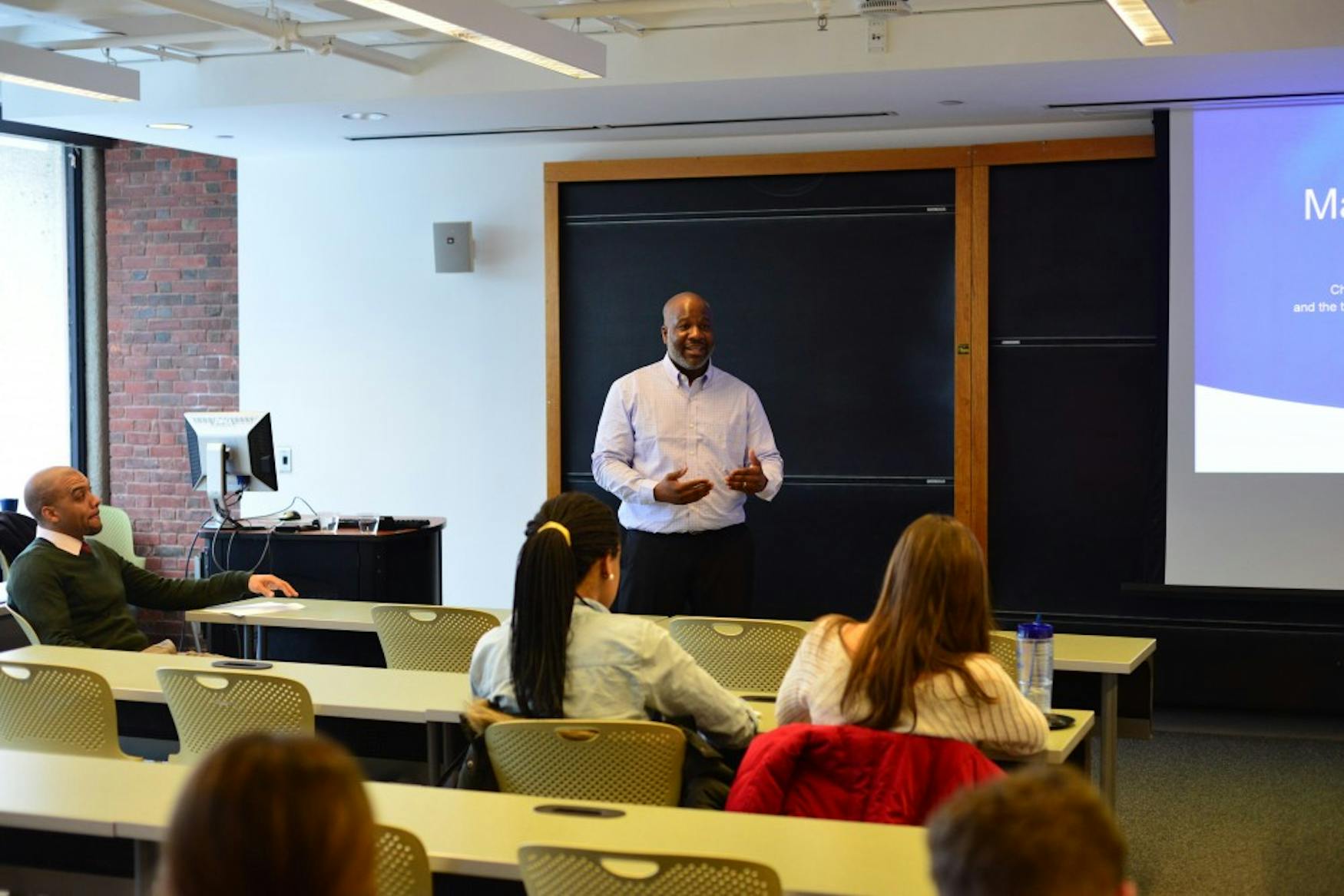Lecture focuses on Mandela, apartheid
Corrections appended.
This article originally misidentified Prof. Laurie Nsiah-Jefferson (AAAS, Heller) as commenting on Rev. Dr. Martin Luther King Jr. and Nelson Mandela's legacies after the lecture. These comments were made by Prof. Faith Smith (AAAS, ENG, LALS, WGS).
On Thursday, the African and Afro-American Studies department hosted Dr. Robert Trent Vinson for a guest lecture on anti-apartheid advocate Albert Luthuli. The audience included undergraduates, graduate students and professors.
Vinson is the Frances L. and Edwin L. Cummings associate professor of History and Africana Studies at the College of William and Mary. His lecture was derived from research for his forthcoming book, Before Mandela, Like A King: The Prophetic Politics of Chief Albert Luthuli.
Vinson’s lecture, “Albert Luthuli, Nelson Mandela and the Genealogies of Armed Struggle in Apartheid South Africa,” was the AAAS department’s 30th annual Ruth First Memorial Lecture, which is named in honor of a white journalist who exposed corruption under the apartheid government. Vinson told the Justice at the event that he accepted the invitation to guest lecture specifically because he counts First as “one of [his] political heroes” as “she was one of the few whites in South Africa who fought, who refused to accept the racial privilege that the apartheid regime was bestowing on her.”
During his lecture Vinson argued that Luthuli’s non-violent protest tactics paved the way for Nelson Mandela’s rise to primacy in the anti-apartheid movement and that “the Nelson Mandela we knew and loved ... was actually using a template based on the politics of Albert Luthuli in the 1950s and ’60s.”
Vinson began by outlining some of the most important apartheid laws from throughout the 1950s, distinguishing between what historians call “Petty Apartheid,” in which racial intermarriage and civil disobedience were banned, and the later “Grand Apartheid,” in which the black South Africans who made up 80 percent of the country’s population at the time were confined to 13 percent of its land mass.
Vinson said that apartheid was not put forward as “a kind of Nazi-like fascist system,” but was instead viewed as “a kind of solution to the supposed problem of races intermingling.” According to Vinson, Luthuli’s argument was that “apartheid is not a solution to anything ...but that apartheid, indeed, was the problem.”
He explained that Luthuli was “deeply religious” and saw apartheid as “theological heresy.”
Luthuli “felt that apartheid was a violation of the Christianity of Jesus Christ, whom he regarded as a drum major for social justice,” Vinson said. “God did not separate out people saying ‘You should live well, and you should live poorly.’”
According to Vinson, when Luthuli became president of the African National Congress—the oldest political party in South Africa, which opposed apartheid—in 1952, he advocated for international sanctions against the South African government and organized peaceful protests against apartheid, inspired by Mohandas Gandhi.
Luthuli then went on to become the first person from outside Europe and the Americas to win the Nobel Peace prize in 1961, the same year that marked the creation of the ANC’s armed wing, the Umkhonto we Sizwe, meaning “Spear of the Nation” and commonly abbreviated as MK. According to Vinson’s lecture, the branch’s founding was in reaction to a police shooting, and was also what Vinson called “the moment that Nelson Mandela became Nelson Mandela.”
While Vinson noted that there is no historical consensus on whether Luthuli helped create MK, Vinson put forward his belief that it was Mandela who reoriented the ANC toward violent resistance, and that Luthuli did not support violence, but “understood it was collective consensus of leadership to move toward armed struggle.” Vinson concluded the lecture by noting that the Rev. Dr. Martin Luther King Jr. admired Luthuli, and said that “King regarded himself as an American Luthuli.” He also noted that Luthuli is an important figure to study in African Studies, as “Africa and Africans are often sidelined in diaspora studies. It’s still a great weakness in the field.”
During a brief question-and-answer segment after the lecture, Prof. Wellington Nyangoni (AAAS) criticized the lecture for not addressing the Pan-African Congress, the ANC’s rival group, and for not putting criticisms of Mandela in the context of uncertainty surrounding the end of apartheid. Vinson acknowledged the PAC’s importance, saying, “That point needs to be made.”
Prof. Faith Smith (AAAS, ENG, LALS, WGS) commented that figures like King and Mandela are connected in that “we don’t like particular images of them.”
“So, like, the King who was talking about Vietnam [and] the Mandela who was armed and in fatigues don’t gel with the kinds of images of each man that we prefer,” she said.
“We want to hold King there frozen in time on the steps of the Lincoln memorial,” Vinson agreed.



Please note All comments are eligible for publication in The Justice.